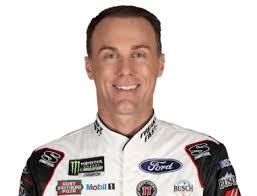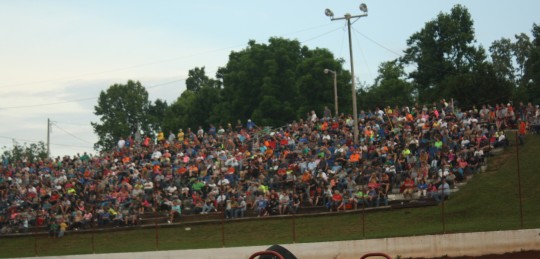In the week leading up to the March 18th running of the Auto Club 400 at the Auto Club Speedway in Fontana, California former Monster Energy NASCAR Cup Series champion Kevin Harvick took the sport’s top sanctioning body to task for what he perceived as a rebuff of the grassroots racing that once served as the primary feeder system for both talent and fans to stock car racing’s highest level. And since that time, NASCAR related personalities have joined in the discussion of the topic raised by the veteran driver.
At that time, Harvick was preparing to compete in a K & N West Pro Series event at Kern County Raceway Park in his home state of California and he took the opportunity to point out the slighting of fans, racers, and tracks by NASCAR over the past couple of decades as the top executives in the corporate buildings fashion themselves as leaders of a national, television oriented enterprise rather than a sport that built itself from the ground up on the asphalt and dirt short tracks that dot the landscape of the working class areas spread throughout the nation.
“One of the best things that happened for racing, it’s not just about NASCAR, was when we had the Copper Classic here,” Harvick declared in the press conference following his win in the Monster Energy Cup race at Phoenix’s ISM Raceway. “We had midgets, sprint cars. It didn’t matter how many people sat in the grandstands. As competitors, those guys, this was their Daytona.”
In particular, Harvick was bringing attention to the fact that the Arizona track no longer plays host to the mostly short-track based K & N West Pro Series. The one-mile facility hosted events on that tour from 1998 to 2015. Further, the Bakersfield, California native went on to point out that NASCAR has played a roll in causing tracks to exclude smaller series such as the K & N tour by placing high sanctioning fees on tracks for the Xfinity Series and Camping World Truck Series races that often make up part of a typical Monster Energy NASCAR Cup Series event weekend. It is the driver’s belief that those high sanctioning fees force tracks to make either/or decisions that result in the grassroots racers being pushed aside.
“It’s kicking those guys low on the K & N West Series that they don’t get to come and race at this particular racetrack because of the fact there’s a little bit of a pissing contest between a budget, what is right, what is wrong from a sanctioning fee side on Trucks and Xfinity,” Harvick added. “So they cut the K & N guys out. Cutting the grassroots side of things out is not the right way to do things.”
And more than just the competitors are being pushed aside according to Harvick. The fans who pass through the gates of the many short tracks around the nation no longer feel an attachment to the sport’s highest level. And with fewer and fewer ties between NASCAR and the grassroots of racing, he fears that the disconnect will have far reaching implications for both sides of the sport.

Kevin Harvick worries that empty grandstands may become more commonplace in NASCAR as short-track fans feel more alienated
“In the end, without the grassroots fans, those grassroots people, coming and being able to race here, whether it fits your budget or not, ten years from now you better hope you have some people who will sit in the stands up there wanting to watch these races at your short tracks because those are your hardcore fans.”
It should be pointed out that despite Harvick’s claim that the NASCAR company has distanced itself from short-track racing, the competitors themselves have not. A number of the sport’s top stars have invested their time, talents and money in various forms of grassroots racing. Tony Stewart, Clint Bowyer, Kyle Busch, Kyle Larson, Kasey Kahne, Denny Hamlin, and Ricky Stenhouse, Jr. are among the drivers in the Monster Energy NASCAR Cup Series who are involved in dirt or asphalt short track racing as team owners, track owners or race promoters.
But even with the involvement of those well known personalities, many fans at the grassroots level feel abandoned by NASCAR. The sanctioning body’s decisions throughout the 1990’s to move away from venerable old venues such as North Wilkesboro and Rockingham along with date changes and reductions at tracks such as Darlington in favor of new facilities in Chicago, Kansas City and Homestead may have made economic sense on paper but deeply cut into the fandom of many who had followed the sport for years or even decades.
Now the questions linger. Are those one-time fans who religiously followed the sport too alienated to come back? If the brass who inhabit the top level office spaces in NASCAR’s corporate building were to follow Harvick’s suggestion and renew the sanctioning body’s involvement in grassroots racing could it rekindle the fire that once was?
As many who keep up with business trends know, it is very difficult to bring something back that has fallen out of favor. That’s true of just about anything, not just sports leagues.
Years ago, it was not uncommon for local tracks to take the weekend off when NASCAR ventured to their part of the country because those tracks knew their regular fans would be attending the races held at the bigger speedway in the area. This weekend with NASCAR set to race at Bristol Motor Speedway, virtually every track located in the east Tennessee region is going ahead with business as usual. For that matter, many of them are hosting big races, seemingly unconcerned that fans may be opting to save their money for the NASCAR sanctioned races taking place on Saturday and Sunday.
The reality is that the grassroots racing Harvick spoke of has almost completely divorced itself from NASCAR. It’s almost as if the two operate as totally separate entities now. And it would seem to be a very difficult task to ever reunite the two.







